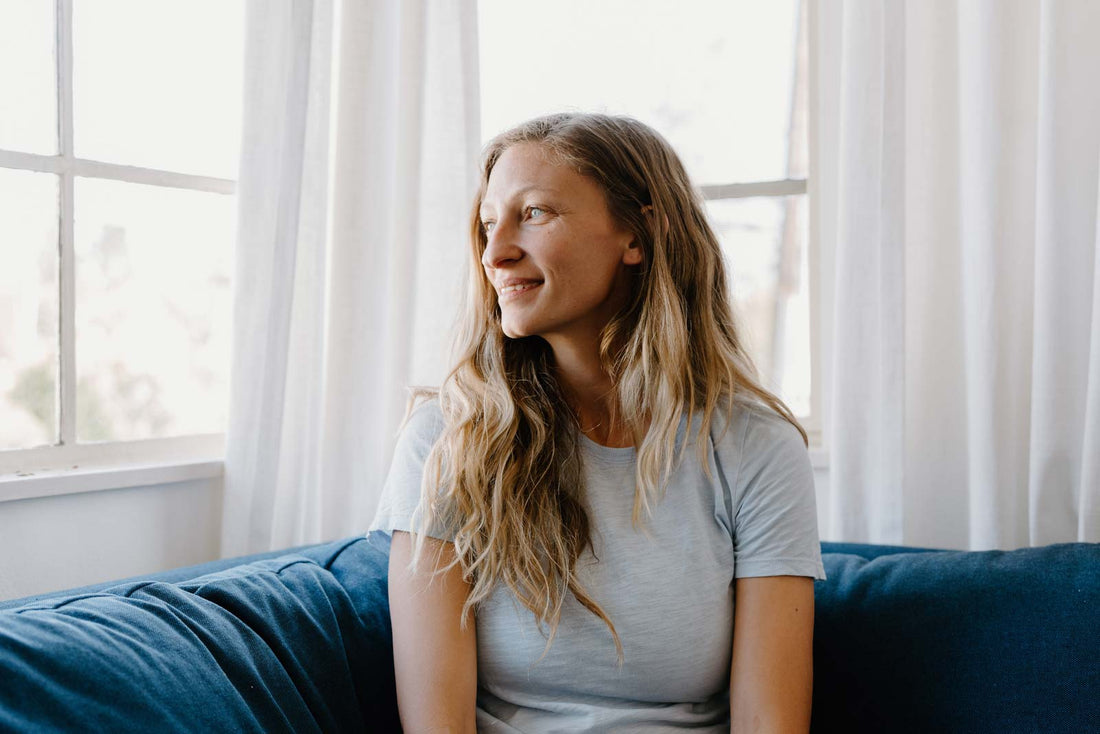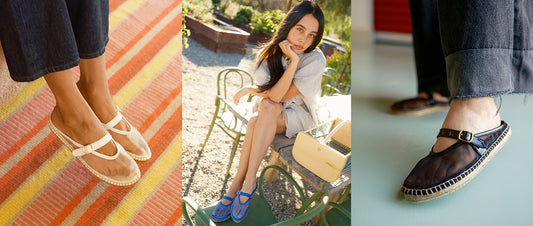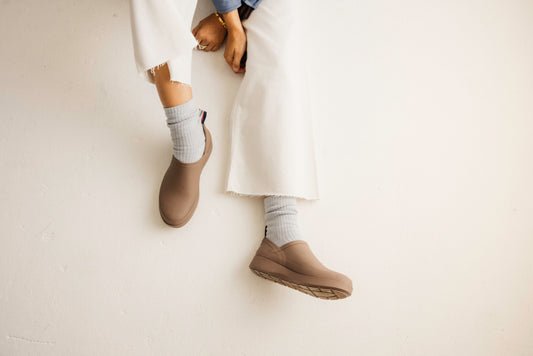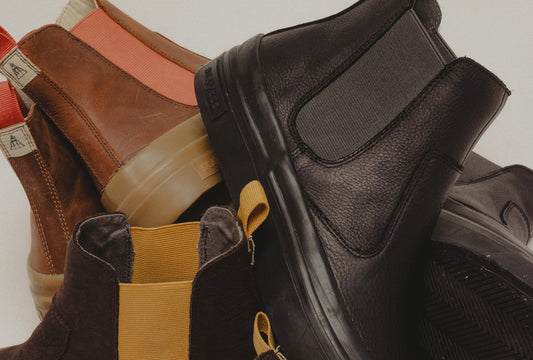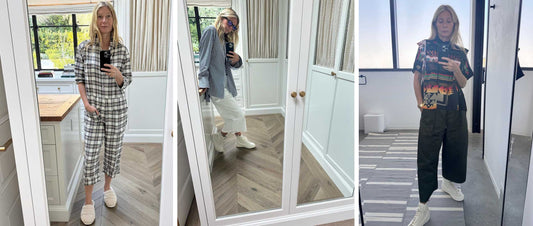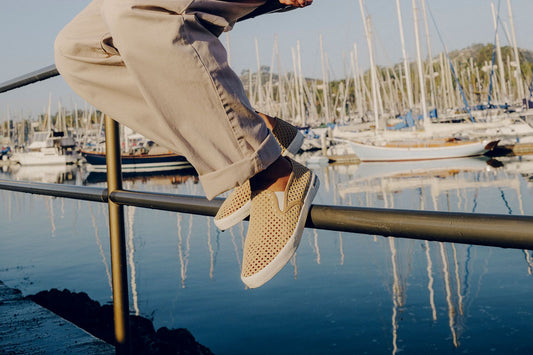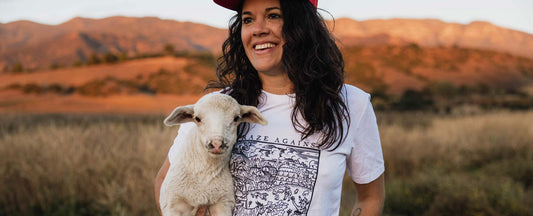The dawn sky is just starting to bleed from inky blue to deep purple when Karly Borden’s van rumbles to a stop at Butterfly Beach in Santa Barbara. Dressed in a collegiate-style sweatshirt, Karly pulls her wavy blond hair into a loose braid, slipping on a pair of well-worn sneakers as more women start to quietly congregate around her on the sidewalk. Green thermos in hand, Karly is there to dole out both caffeine and a reminder to the group of runners who have gathered there: running should be fun.


Karly is the founder of The Public Run Club, an online membership platform where she coaches women who want to begin, reexamine or deepen their relationships with running. Instead of weekly mileage goals and 5am wakeup times, The Public Run Club members are given journaling prompts, mentoring calls, and an invitation to join digital group runs (runners “meet up” by texting emojis, words of encouragement and photos of themselves before a jog). For The Public Run Club members based in Santa Barbara, there’s also the option to meet up every Friday for an in-person, choose-your-own adventure style run: one, two or three-mile loops around the neighborhood followed by coffee and a grounding meditation.
Karly’s embodied approach to movement prioritizes mindfulness and mental health, and more than 70 members join her from around the world each season to unlearn old rules about running and “begin again.” But beginnings don’t always come easily, something Karly reexamined during her pregnancy, a personal journey that led her to look more deeply at her dream of supporting women in their entirety.
Words by Karly Borden as told to SeaVees. All photos by Johnie Gall.

"My mom was a bodybuilder and a runner. My dad was in the military so we moved often, and when we were living in England she decided to start a women’s running network — I think she was lonely. She’d literally run around the neighborhood passing out business cards. All these women who’d never really run before started meeting at local pubs to run together. I was ten years old and that was my first running group. I learned that movement and community could go together through my mom.
I didn’t think I wanted kids. That was almost a breaking point for me and my husband, Trevor. I felt terrified in big, nebulous ways, but also of the grief of certain parts of my life ending. There are so many big endings you have to go through. I did EMDR (eye movement desensitization and reprocessing) therapy to try to address it — it’s a kind of alternative therapy that felt more helpful for me over talk therapy at that point. I had this image of all these parts of me, some of them turned toward motherhood and some that were turned away, and I came to understand the parts that were turned away were just the parts that were afraid.
“I didn’t think I wanted kids. I felt terrified in big, nebulous ways, but also of the grief of certain parts of my life ending."
I walked out of a particular therapy session and wrote Trevor a letter. Sitting at a little cafe together, I handed him the letter, and as he read it he just wept and wept. It was a list of things I was excited about: telling my grandmother I’m pregnant, seeing my brother hold my baby for the first time. All these things I hadn’t let myself feel because I was so afraid and hadn’t wanted that to escalate. I still have the letter — I wrote it on August 28, 2019. Robin was born on August 28 a year later.


Being pregnant during the pandemic was an incredibly lonely experience. My siblings didn’t get to see me pregnant, and that feels like a big deal to me because I was my pregnant body. We had no idea what was happening, washing every damn thing that came into the house, all that time feeling isolated and high risk. I was surprised at how quickly I fell into a comparison mentality. Other examples of motherhood can be great sources of inspiration, but if they are making you feel less than, they aren’t really inspiration. I saw all these athletes continuing to run throughout their pregnancies and I had to stop at 22 weeks due to pain. Sitting at the kitchen table, I broke down in tears: if my body was weaker than I thought, what would that mean for labor and delivery?
I delivered Robin like I chose, at home. It took me months to be able to tell his birth story because, while there was no real crisis, things hadn’t felt good and I couldn’t put my finger on why. I always thought I’d be able to pinpoint if I was having postpartum depression and be able to ask for what I needed, but you are just so disoriented. Motherhood is f*cking crazy! I took 12 weeks off from work, but since I own my business I didn’t get paid maternity leave, it just meant I front-loaded the work. I was just so afraid of becoming invisible to the world by not having a presence. That’s what motherhood feels like in general.

I think one of my trauma responses is to do research. I was up late one night online just searching “motherhood, study of motherhood, sociology of motherhood.” I wanted to learn anything other than, you know, what time to put the baby to bed. What about my experience? What about what I’m going through? That’s how I learned about matrescence, which is the actual process of becoming a mother. I signed up for a certification course on it immediately.
"I had to stop running at 22 weeks due to pain — I broke down in tears of fear. If my body was weaker than I thought, what would that mean for labor and delivery?"
What I’ve learned is that becoming a mother cracks you open — it’s the epitome of vulnerability. We look back at adolescence and we understand the angst of that transformation, the times we didn’t get the information or support we needed. A new mother undergoes the same kind of identity shift almost overnight on seven different planes: physical, mental, cultural, spiritual, financial, relational and hormonal. That can resurface old traumas and attachment styles, the way you were nurtured or not nurtured as a child, all while you’re forming new attachments to your baby. That matters generationally, it gets passed down. Which is not to say people with trauma or who are not supported can’t form strong attachments, that’s bullshit, but how can we help birthing parents actually be with their babies?


It’s wild we even have to ask that question. Right now, we’re experiencing these big discussions around paid maternity leave, a formula shortage, women’s body autonomy, and it’s clear there are so many systemic limitations to mothering. I hold all the identities dominant in our society — white, cisgender, able-bodied — and I still don’t feel supported, which means people who hold different identities are even less supported at best, and actively oppressed at worst. I’m realizing how important it is to listen to the needs of the birthing parent in a way that humanizes them. What if we took their needs seriously and stopped dismissing it as a hormonal experience?

I have multiple roles: coach, business owner, mother, and now teacher. I give free talks to a mom’s group in Santa Barbara called Center Line about matresence and body image, about mothering as a portal for healing. I don’t have a clear path for the ways I’m going to translate my new certificate into an offering for The Public Run Club yet — I think it’s more about being able to show up more authentically as myself first. When I came back from maternity leave, I remember feeling like I was really walking the walk of what I invite my runners to do in terms of showing up as they are. That looked like joining one of our calls while nursing Robin, or doing my daily activity in my pajamas. I may have been falling apart at the seams, but I felt the beauty of the community I’d built around showing up as we are.
“One of things I’m learning is that once a woman becomes a mother, how she is supported cannot be separated from motherhood.”
I underestimated how important community would be, just being able to share experiences with people going through the same thing. I had a friend who really saw me struggling during pregnancy. She sent me a card from People I’ve Loved that says “Real Hope 4 the Future.” It hung in my room throughout my pregnancy. She went on to give me one of the most important gifts of my life: she researched and made me a list of therapists who specialize in postpartum support who she thought could help me. I’m still seeing one of them. The times I have felt most supported in life were when people really saw me — not just as an athlete or a mom, but in my entirety.


One of things I’m learning is that once a woman becomes a mother, how she is supported cannot be separated from motherhood. We need to look at her through the lens of mothering — it’s controversial, because motherhood has been so reduced in our culture that women are afraid of embracing “mother” as an identity, and rightfully so. There are so many power systems at play that shape a woman’s value, and my dream with The Public Run Club is to confront those and run on our own terms. If that’s not just about body shape and size and ability, but body autonomy — experiencing ourselves experiencing our lives. I can’t help but wonder what our world would look like if our whole culture felt the same responsibility for supporting mothers."
Karly wears Hawthorne Slip Ons from the Classics Collection.

